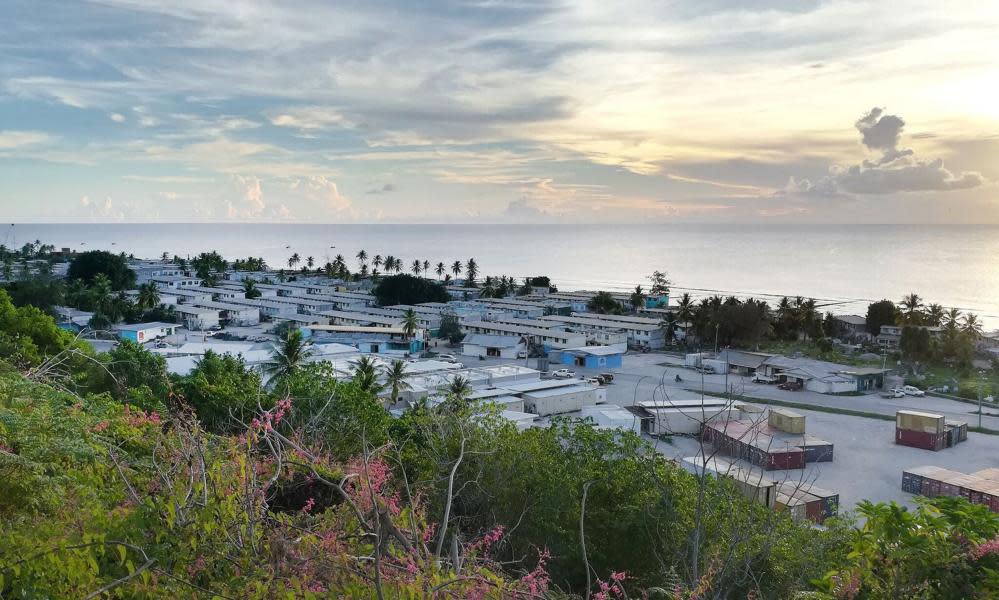Australian government awards Serco $9.9m contract to help non-citizens return home

The Australian government has awarded a $9.9m contract to Serco to run a program helping return non-citizens to their home countries, a service already being provided by the UN.
The contract was awarded in October and published in December after an open tender process. It runs for two years, at a cost of about $415,000 a month.
The existing voluntary assisted returns program had been designed and run by the UN’s International Organisation for Migration (IOM) “to help eligible migrants make informed and voluntary choices about returning to their country of origin” since about 2010.
Related: Biloela Tamil family deportation case: asylum seekers can stay until final hearing
The IOM told Guardian Australia its operations had not changed since Serco began offering a service, describing it as a “parallel provider”, but did not respond when asked if it had bid for the $9.9m contract.
Serco has previously run immigration detention operations for the Australian government, both onshore and offshore, and has been subject to numerous allegations of mistreatment.
Stakeholders – who would often refer non-citizens to the IOM program – told Guardian Australia they weren’t aware until recently that Serco now ran an assisted returns service.
“Having Serco, an organisation with a disturbing track record who already manage the detention of people seeking protection, also managing their return adds alarming concern to an already concerning area of practice in our immigration system,” Sarah Dale, the principal solicitor at the Refugee Advice and Casework Service, said.
“Having IOM facilitate these returns gave people more confidence that returns were facilitated justly and with dignity, working within the principles of the UN guidelines.”
The IOM service assists and funds migrants’ return to their home countries, and includes people on temporary visas or who were living in Australia without a visa or whose visa was cancelled, or people found not to be refugees in Nauru.
It was also available to people who had sought asylum in Australia by boat, termed “irregular maritime arrivals” (IMAs) by the Australian government.
It’s not clear what difference there is between the two services. Serco’s Homeward program does not appear to provide reintegration assistance for people when they get back to their home countries, which is a significant part of IOM’s work, however the tender notice describes the contract as “Return and Reintegration Assistance Program”.
Serco directed questions to the home affairs department and to the Homeward website.
“The Assisted Returns Program provides non-citizens with an option to voluntarily depart Australia,” its website says.
“If you are deemed eligible, expenses related to your approved travel arrangements will be covered under the Assisted Returns Program.”
The Homeward website includes three anonymised “client stories”, including an Iranian man who arrived in Australia by boat in 2013. It said the situation in Iran had since “changed for the better”, including the political environment.
“Babak spoke at length with his family and then visited the Department of Home Affairs to work out a way to depart Australia and go home,” it said.
“Upon making his decision, Babak sought pre-return advice and counselling about his options from the Homeward team. Still nervous about his decision, Babak made the step to voluntarily return home and is now working with his brother in Tehran.”
Dale said the system of voluntary returns was in itself questionable.
“At RACS we are often told that people have reached the ‘end of the line’, with the department referring to people as ‘finally determined’, when in fact people still have legal options available to them such as judicial review processes,” she said.
“The alignment of detention and returns creates further concern that people will not have access to the options they should have access to under the law.”
In 2018 the IOM assisted 821 migrants to return home to 70 different countries from Australia, including 194 people to Sri Lanka.
Related: Paladin forced to pay back $5.7m for failures in offshore detention services
In the preceding five years the IOM has assisted the return of 4,920 people from Australia. Since 2010 it has assisted more than 2,750 boat arrivals to return home.
Most of the 2018 intraregional transfers (which were 68% of returns in the region), went from Australia, Indonesia and Thailand, to Sri Lanka, Pakistan, Malaysia, Iran, and Afghanistan.
The 2018 report noted that requests for assistance exceeded the IOM’s available funds, and so in consultation with the Australian department it focused on vulnerable applicants, including victims of human trafficking and related exploitation, single-parent families with young children, and the elderly.
Dhakshayini Sooriyakumaran, the director of human rights at the Australasian Centre for Corporate Responsibility, said Serco’s continued work in a sector associated with human rights abuses, would likely negatively impact its contracts in other areas of social service.
“Serco profits from the provision of social services, such as hospitals, housing, and other essential services throughout Europe, US and Australia. Growing community opposition to immigration-related human rights abuses globally, including detention and deportations, puts Serco at odds with the communities it is tendering to serve,” said Sooriyakumaran.
“In Australia, a number of local councils – at the behest of their communities – have already passed motions stating that they will not contract from companies actively involved in immigration-related human rights abuses.”

 Yahoo News
Yahoo News 
